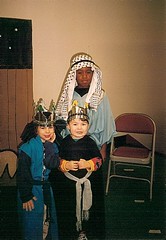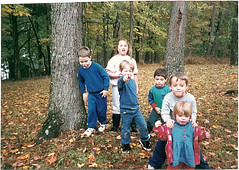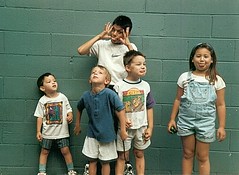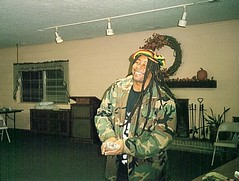Life at Jeff Street
Jeff Street Baptist Community at Liberty. It's a confusing mouthful for a group that might better be known as the Church, formerly of Jeff Street, formerly Baptists (and Catholics, Presbyterians and given-up-hope) which is now at Liberty, literally and figuratively. We are a mutt. The wretched refuse. The divine community. God's Kingdom come. Welcome. [Disclaimer: The views within this blog are doubtless pretty cool. Nonetheless, views expressed are those of the individual and not Jeff Street.]
Friday, September 30, 2005
Jacob have I loved...
As for me, as I read the story of Jacob and Esau...just about every time I’ve ever heard this story, what has always hit me at a real gut level is Esau’s plaintive cry: “Bless me, also, my father!…Is there no blessing for me?” I hear that, and I hurt for Esau. I hear that, and I’m troubled by the actions of Rebekah and Jacob—disturbed that “God’s chosen” could act in such a way, could by deceit wrench away that which was rightfully Esau’s.
But this time around, as I’ve struggled with this story, I’ve realized that part of the reason that I’m seeing the story this way, that I’m feeling the story this way is that I’m approaching this story from the position of privilege. I am a heterosexual middle class European American, and though I’ve had my struggles with inequality as a woman, I’ve nevertheless greatly profited from a system that has given me food on the table, clothes in the closet, a good education, a chance to pursue any one of a multitude of vocations.
As a European American, I’ve benefited greatly from white privilege, which according to Peggy Macintosh is “invisible systems conferring dominance on my group,” so that, for example, I can be pretty sure that if I ask to talk to the "person in charge", I will be facing a person of my race, or if a traffic cop pulls me over or if the IRS audits my tax return, I can be sure I haven't been singled out because of my race, or I can talk with my mouth full and not have people put this down to my color, or I can swear, or dress in second hand clothes, or not answer letters, without having people attribute these choices to the bad morals, the poverty or the illiteracy of my race.
But it’s not just that: there are all kinds of privileges that have been inferred upon me as well simply because I am an American.
It’s no wonder, then, that I approach this story from a position of privilege, from the privileged one’s perspective, that I enter into this story as though I were in Esau’s shoes. I have assumed that the blessing was “rightfully” Esau’s and on the basis of that assumption, have condemned Jacob and Rebekah for their actions.
Why have I assumed that the blessing was rightfully Esau’s? Well, because that was the way that it was done in that culture, and in many cultures since: the oldest son received double or all of the inheritance upon the father’s death, and Esau was the oldest son. Okay, that’s the way it was done. But still, why have I assumed that the blessing was rightfully Esau’s? Because I’ve been willing to let the powerful define what is rightful in this story. Because I have confused “the way things are always done” and what it is right.
======
By Pastor Cindy, who isn't often confused
Wednesday, September 21, 2005
Wednesday, September 14, 2005
Allah Al-Ghaffur, Part I
A sermon from our sister Karen, who ministers in Morocco, that she preached in that heavily Islamic nation on September 11. A moving call for shocking forgiveness in the memory of great tragedy. Thanks, Karen.
And He alone is truly forgiving,
all embracing in His love,
in sublime almightiness enthroned,
a sovereign doer of whatever He wills.
The Qur’an, Sura Al-Buruj 85:14-16, tr. Asad
As I mentioned last Sunday, the readings we’ve heard from Matthew 18 last week and this week are part of a collection of teachings on forgiveness.
As I sat down to plan worship for tonight and looked at the date, it struck me that there was great poignancy in the fact that we are invited tonight to call ourselves to forgiveness on the anniversary of the terrorist attacks of 9-11-2001.
I personally cannot utter that date without feeling sick in my gut, both over the events of the day and all that has transpired since, an escalation of enmity – bombings and beheadings, Afganistan and Iraq, Abu Ghraib and Guantanamo, Casablanca, May 16th 2003, Madrid, March 11 2004, and London, July 7 2005 – How many names, how many dates to go down in infamy?
And for us, en terre Islam, as the French say, Christians living in the Muslim world, there is a particular poignancy. I invite us tonight to experience the distress of the call to forgive in this post-9-11 world by invoking the name of Allah Al-Ghaffur, God the forgiving one.
It may surprise us Christians to learn that Allah is named “The Forgiving One” 97 times in the Qur’an. I think (though I am not sure so don’t quote me on this), that this is the third most common name for God found in the Qur’an, right after Ar-Rahim (the merciful) and Ar-Rahman (the beneficent).
We Christians tend to think of God being portrayed in the Qur’an as a God of judgment who simply weighs good deeds against bad ones and then sends souls off to the destination indicated by the scales of justice – paradise or hell...
God is the forgiving one, the root word Gh –f- r meaning to forgive or to cover, conceil, or veil, as in to cover sins so that, according to Islamic tradition, they cannot by seen by any, “even by the angels”. Sound familiar: “Love covers a multitude of sins,” we read in 1 Peter. So, in Islam, Al Ghaffur is the perfection of forgiveness, the One whose forgiving demonstrates excellence, completeness and perfection of forgiveness.
Now I can’t help but think of a Lyle Lovett song when I think of God’s capacity to forgive. Maybe you know it. It’s called “God will.”
Who keeps on trusting you When you've been cheating
And spending your nights on the town
And who keeps on saying that he still wants you
When you're through running around.
And who keeps on loving you When you've been lying
Saying things ain't what they seem?
God does, But I don't. God will, But I won't
And that's the difference Between God and me.
I love the song. [I first heard it at Jeff Street Baptist Community at Liberty, by the way ...] It so blatantly states what most of us believe – that there’s a limit to what we should forgive. Certainly that was what Peter thought. Should we forgive a brother or sister as many as seven times, he asked the Lord (seven being the number of perfection, completeness in Hebrew thought.) And then, of course, he is taken aback, as folks so often were, by Jesus’ response, “Not 7 times, but 70 times 7”: Perfection in forgiveness to the nth degree.
Now, going back to Lyle Lovett, I believe we need to make a little distinction here. Like Lyle, and Peter, I believe there are limits as to what we should accept with respect to behavior of others toward us. We should not simply accept to be abused over and over again saying that is what forgiveness requires. We are called to say no to abuse and to injustice – the Bible doesn’t call on the poor to just sit back and take it when greedy, unjust rulers exploit them.
That limit, however, is not something one can calculate – when is a relationship beyond repair – it’s not a matter of getting the right mathematical equation to determine that. Don’t think Jesus meant we should learn to keep score up to the magic number 490. So there may come a time when a Christian may say to one asking for forgiveness that trust has been shattered and the relationship cannot continue. That’s a painful reality. However, even if we get that point, perhaps particularly when we get to that point, we still have to forgive.
We may be called to separate ourselves from the one who has hurt us and keeps hurting us, but we will still, brothers and sisters, have to learn to forgive him, to forgive her.
======
by Reverend Karen. BUT WAIT! There's more...
Weird Irwins
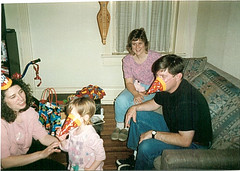
Weird Irwins
Originally uploaded by jeffstreet1.
CONGRATULATIONS to those weird Irwin folk! Welcome, Duncan!
Allah Al-Ghaffur, Part II
We stop God’s healing forgiveness from covering us like a balm.
But here’s the kicker. We can’t simply WILL to forgive someone. We just can’t. We tell our kids to do it, “Forgive your brother,” and when it comes to forgiving a whack on the head from a plastic truck, the kids manage to simply obey that command to forgive. But deeper wounds caused by greater malice -- betrayals, abuses, intentional harm – these are not things we can simply forgive by saying, “I forgive you...”
Even when we want to forgive the wrong, and we try, we find that our anger, and hurt, and bitterness keep surfacing requiring us to admit that we haven’t gotten there yet. The pain of the divorce, the desertion of a parent, the betrayal of a colleague, the infidelity of a spouse, evil inflicted upon our children by another – three words won’t make it all okay.
We want to be Christ-like and practice the forgiveness we preach, but it just doesn’t seem to take. Paul has summed up our human condition, “in my flesh. I can will what is right, but I cannot do it. For I do not do the good I want, but the evil I do not want is what I do.”
We want to bless those who have cursed us, but we find curses rising in our throats. We want to forgive trespasses in love, but hateful thoughts are flashing through our minds. We want to pardon fully and freely, but something deep within us calls for vengeance.
Now look again at... the quote from the Qur’an. When I pondered this verse this week, I had an “Aha” moment. At first, I didn’t see a connection between the first half of the quote: “And He alone is truly forgiving, all embracing in His love,” and the second half, “in sublime almightiness enthroned, a sovereign doer of whatever He wills.”
The first part seemed to be emphasizing God’s love and closeness to us while the second part re-asserted God’s might and distance from us. However, upon reflection, it dawned on me that to truly, perfectly forgive is an enormous thing, requiring a power that is nearly inconceivable, and then I saw that phrase, “a doer of whatever He wills”.
And maybe, in this instance, that’s the difference between God and us. Because it doesn’t mean, or he can do whatever he wants to in some arbitrary fashion, it means that, unlike us, God wills to do something and does it. As God’s will is to love, God loves and does not act in evil. As God’s will is to forgive, God does it; God pardons fully and lets it go and bears us no grudge...
======
by Sister Karen, BUT WAIT! There's more to come...
Allah Al-Ghaffur, Part III
As for me, I’m really not sure what it means for us humans to forgive except to keep turning over these struggles to the Forgiving One and trying to love across and over the divide of transgression and pain that would separate us from those we struggle to forgive. And as we keep trying to trust God to allow love to take precedence over bitterness and anger, over time, love wins.
We realize the pain is no longer gnawing at our bones, that the tightness has loosened; and as for the one who has hurt us, we find we truly do wish him or her well. It’s as if we have been bathed in waters of forgiveness and the wounds have healed. They are now scars that tell the story of our life, but, through Christ Jesus, it’s not a tragedy; it’s a story of redemption – redemption of sins and evils, our own and those of others, that Christ has turned to work for good.
I want to close by reading to you some words written by Christian de Cherge, one of the seven Trappist brothers kidnapped by Islamic extremists in March, 1996, and murdered by them after two months of captivity; the stated reason for the killing was that the brothers were encouraging evangelism.
Brother Christian, prior of Notre Dame de l’Atlas monastery in Tibhirine, Algeria, had anticipated that one day, he might be killed in the terror ravaging Algeria. So he left a testimony for his family to open if and when that day came. So in May, 1996, Christian’s family shared these words with the world:
If it should happen one day, and it could be today, that I become a victim of the terrorism which now seems set to engulf all the foreigners living in Algeria, I would hope that my community, my Church, and my family, would remember that my life was given to God and to this country. I ask them to accept that the one Master of all life was not a foreigner at this brutal departure… I would like them to be able to link this death with so many other deaths, equally violent, but shrouded in indifference and anonymity… When the time comes, I would like to be able to have that stroke of lucidity which would permit me to ask forgiveness of God and of my brothers in humanity, forgiving whole-heartedly, at the same time, whoever my killer might be.
Returning to the thought of forgiveness in the last words of his testimony, Christian addresses his killer:
And so, this letter of gratitude, this “A-Dieu”, committing all to God, is intended for you, also, my friend of the last moment, you who will know not what you do. If God our Father wills it, may we be allowed to meet in paradise, the two of us together, blessed thieves.
That is a fearful and wonder-ful legacy for us, brothers and sisters. It is my prayer that here we would cultivate a culture of gratitude and forgiveness that will help us all on the journey as we seek to trust and serve God, the Forgiving One, Allah Al Ghaffur. For God can and WILL redeem it all, bringing healing in our own lives and in this world that God so loves.
Through Jesus Christ our Lord. Amen.
=====
by Sister Karen, our Moroccan Momma
Monday, September 12, 2005
Friday, September 09, 2005
Entertainment Tonight
dtrabue
To listen to the sweet soft sound
crowcall
cricketsong
childlaughter
To clap to the windtree rhythm
for Lady Butterfly
in her comedy
and grace
To dance the very same jig
That He himself
taught mother creation
as they swung around
Eden's Grand Ballroom
This is all the entertainment I need
or ask
save this -
to share it with loved ones
known and unknown.
